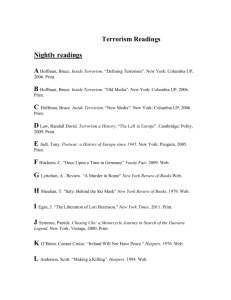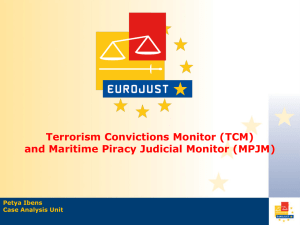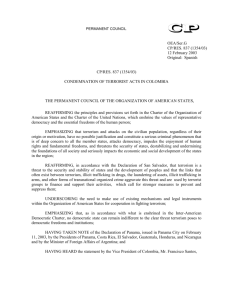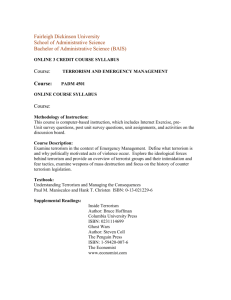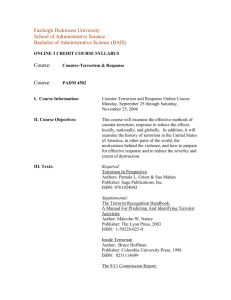English - Inter-Parliamentary Union
advertisement
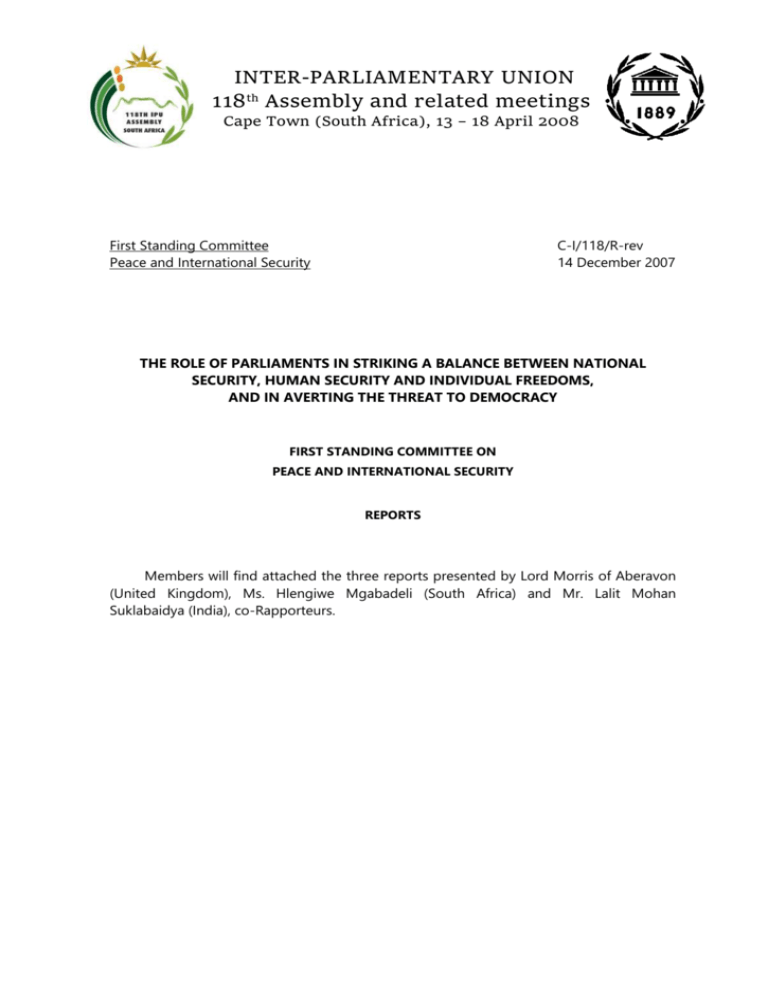
INTER-PARLIAMENTARY UNION
118th Assembly and related meetings
Cape Town (South Africa), 13 – 18 April 2008
First Standing Committee
Peace and International Security
C-I/118/R-rev
14 December 2007
THE ROLE OF PARLIAMENTS IN STRIKING A BALANCE BETWEEN NATIONAL
SECURITY, HUMAN SECURITY AND INDIVIDUAL FREEDOMS,
AND IN AVERTING THE THREAT TO DEMOCRACY
FIRST STANDING COMMITTEE ON
PEACE AND INTERNATIONAL SECURITY
REPORTS
Members will find attached the three reports presented by Lord Morris of Aberavon
(United Kingdom), Ms. Hlengiwe Mgabadeli (South Africa) and Mr. Lalit Mohan
Suklabaidya (India), co-Rapporteurs.
-3-
C-I/118/R-rev
THE ROLE OF PARLIAMENTS IN STRIKING A BALANCE BETWEEN NATIONAL
SECURITY, HUMAN SECURITY AND INDIVIDUAL FREEDOMS,
AND IN AVERTING THE THREAT TO DEMOCRACY
Report submitted by
Lord John Morris of Aberavon (United Kingdom), co-Rapporteur
While there has always between a question of balance between national security on one
hand and individual freedoms including human security on the other, the growth of
terrorism has been a catalyst in the need to re-consider where the balance should lie.
The UN General Assembly Resolution 54/164 Human Rights and Terrorism
(17 December 1999) recognises that terrorism is aimed at the destruction of human rights,
fundamental freedoms and democracy.
The Council of Europe (Convention on the Prevention of Terrorism (CETS No.196 signed
16 May 2005) states:
"Recognising that terrorist offences, etc, by whoever perpetrated, are under no
circumstances justifiable by considerations of a political, philosophical, ideological,
racial, ethnic, religious or similar nature."
The Universal Declaration of Human Rights, (UN General Assembly 1948) Article 3 states:
"Everyone has the right to life, liberty and security of person".
The European Convention for the protection of human rights and fundamental freedoms,
states:
"Everyone’s right to life shall be protected by law." The lawful exceptions are listed.
The Secretary General of the UN in his report, "uniting
recommendations for a global terrorism strategy". (17 April 2006)
against
terrorism,
"The United Nations should project a clear, principled and immutable message that
terrorism is unacceptable. Terrorists must never be allowed to create a pretext for
their actions. Whatever the causes they claim to be advancing, whatever grievances
they claim to be responding to, terrorism cannot be justified. The United Nations
must maintain the high moral ground in this regard."
The summary of UN Resolution 60/158 reaffirms that States must ensure that any measure
taken to combat terrorism complies with their obligations under international law, in
particular human rights, refugee and humanitarian law and called upon States to raise
awareness about the importance of these obligations among national authorities involved
in combating terrorism.
-4-
C-I/118/R-rev
This is the balance that has to be struck. The circumstances change, sometimes very
rapidly. The principles remain the same.
The International Covenant on Civil and Political Rights (which came into force on
23 March 1976), article 4: "In time of public emergency which threatens the life of the
nation and the existence of which is officially proclaimed, the States Parties to the present
covenant may have measures derogating from their obligations under the present
covenant to the extent strictly required by the exigencies of the situation, provided that
such measures are not inconsistent with their other obligations under international law
and do not involve discrimination solely on the ground of race, colour, sex, language,
religion or social origin." France and Trinidad have entered reservations on the covenant.
UN Resolution 60/158 recalled that any measures derogating from the provisions of the
covenant must be in accordance with that article in all cases, and underlined the
exceptional and temporary nature of any such derogations.
Derogation provisions exist for the European Convention on Human Rights (Article 15).
Article 15 incorporates, in effect, the principle of necessity common to all legal systems.
Most states have provisions for emergency legislation, empowering them to take
measures in a state of emergency which would not otherwise be lawful.
Notwithstanding problems caused for a number of contracting parties by increases in
terrorism activity, there are currently no extant derogations to either convention.
The Secretary General of the UN in his report to the General Assembly 11 September 2006
in his conclusions refers to particular instances of concern.
"40. The United Nations human rights system continues to address the question of
the protection of human rights and fundamental freedoms while countering
terrorism with a view to assisting Member states in abiding by their international
human rights obligations while effectively combating terrorism.
41. The High Commissioner for Human Rights, human rights treaty bodies and
various special-procedure mandate-holders of the Human Rights Council all have
expressed grave concerns regarding the alleged use, by some Member states, of
secret detention centres and the practice of irregular transfers of persons suspected
of engagement in terrorist activities. Serious concerns also have been expressed
over the use of diplomatic assurances to justify the return and transfer of suspects to
countries where they may face a risk of torture.
42. Member States should reaffirm their commitment to the total prohibition of
torture by prohibiting torture and cruel, inhuman or degrading treatment in national
law; prosecuting those responsible for torture and ill-treatment; and prohibiting the
use of statements extracted under torture, whether the interrogation has taken place
at home or abroad. Measures should be taken to ensure access to all prisoners in all
places of detention, and to abolish places of secret detention. Further, Member
-5-
C-I/118/R-rev
states should abide by the principle of non-refoulement and refrain from returning
persons to countries where they may face torture.
43. The entry into force of the Optional Protocol to the Convention against
Torture on 22 June 2006 is a significant development towards ensuring the
protection of detainees around the world. The Optional Protocol strengthens the
Convention against Torture by establishing an international Subcommittee on the
Prevention of Torture with a mandate to visit places of detention in states parties
and requiring States Parties to set up national preventive mechanisms, which are also
to be provided with access to places of detention and prisoners. The adoption by
the Human Rights Council of the International Convention for the Protection for All
Persons from Enforced Disappearance is an important step towards further
strengthening the rule of law in countering terrorism. Member states should be
encouraged to ratify and implement the Convention against Torture and its Optional
Protocol, as an important practical measure of good faith and meaningful
commitment to preventing torture and ill-treatment. Further the General Assembly
is urged to consider the adoption of the Convention for the Protection of All Persons
from Enforced Disappearance."
The Optional Protocol represents a major landmark in torture prevention. I welcome the
creation of the Human Rights Council which came into existence following a historic vote
at the UN General Assembly on 15 March 2006.
One of the key challenges facing the Council is the need to establish effective mechanisms
for addressing human rights. The proposed universal periodic review mechanism is a
potentially valuable new tool for addressing human rights in a non-secretive and
transparent way.
Torture has no place in the 21st Century. It is one of the most abhorrent violations of
human rights and human dignity. Its prohibition is absolute. There are no exceptional
circumstances under which its use may be justified. Yet it continues in too many parts of
the world.
Universal declaration of Human Rights Article 5:
No one shall be subjected to torture or to cruel, inhuman or degrading treatment or
punishment.
Where persons are returned from one country to another, each country should satisfy
itself on the possibility of torture. Any agreements reached by States for the return of
individuals should be examined and monitored by Parliaments.
What other machinery is there for monitoring? Monitoring and supervision is not the
exclusive province of Parliaments. National and international judiciaries have a positive
duty to maintain the Rule of Law.
-6-
C-I/118/R-rev
There is a presumption in favour of liberty which is central to the common law tradition.
There is therefore a heavy onus on the State to justify by clear evidence any measure
which reduces liberty.
The doctrine of proportionality has been followed by the European Court of Justice. Every
action of the State or its organs affecting the liberty of the individual must be
proportionate to the mischief itself. Proportionality ensures that the extent of any
interference with a right must be as limited as possible.
The European Court of Justice explicitly takes into account the problems of preventing
terrorism as part of the background when deciding the proportionality of interferences
with certain rights (United Communist Party of Turkey v Turkey (1998) 26 ECtHR121 at
paragraph 59). The fact that attacks have recently taken place will therefore be regarded
as an important part of the context when the justification for measures restricting rights is
being considered.
One of the current issues of controversy in the United Kingdom, and over the last few
years, is the length of time for which a person may be detained for questioning pending
charge. The problem is accentuated when the investigation is taking place before the
occurrence of the terrorist incident against the background of new technologies,
investigations in many other countries and the necessity for the opportunity and time for
transaction. There is no European Court of Justice jurisprudence setting a clear limit on
the length of time for which a person may be so detained. It is for Parliaments to consider
this.
The longer the possible period of pre-charge detention the more important are the
procedural safeguards needed for the detainee to guarantee against arbitrary or
disproportionate detention.
Where an attack has taken place the State is required by Human Rights Law itself to review
the adequacy of the legal measures it has in place to protect people from terrorist attack
and to bring perpetrators to justice, and to take such measures as are identified as being
necessary to provide adequate protection. This must be the first implication of the attacks
themselves.
The onus is on governments to demonstrate the necessity for a new measure to limit the
freedom of the individual and it is for Parliaments to scrutinise closely such measures.
It is a good discipline for governments to certify formally that their proposals are in
accordance with international law and human rights in particular. The rights and duties of
citizens should be clearly set out.
It is for consideration whether recent terrorism is quantitively different from anything
experienced before. Some countries have a long experience of terrorism. Extraordinary
powers sought may, if one is not careful, become ordinary powers.
-7-
C-I/118/R-rev
A supreme court said a few years ago that a democracy must sometimes fight with one
hand behind its back. It is for Parliaments to judge each circumstance as it arises.
One of the problems is that the State usually has greater resources in assessing security
than the Judiciary and the State can always claim necessity, and Parliaments must be ever
vigilant in their role. In matters of national security a judge has stated “the cost of failure
can be high”. Nevertheless there is a particularly strong imperative to subject the impact
of policies on legal rights to the most stringent examination.
The challenge is to decide the extent that an interference with rights can be justified in
order to combat the risk.
In the case of Chahal v UK 1997 23ECtHR413 a substantial minority of the judges in the
European Court of Justice held that States are entitled under articles of the Convention to
balance the extent of the potential risk of ill treatment of the deportee on the one hand
against the threat to their national security on the other. In other words, on the minority’s
view, a State is entitled to expel an individual on national security grounds even where
there is substantial risk of torture or ill-treatment in the receiving country. The majority
found otherwise. The UK is asking leave, which has been granted to intervene in cases
from the Netherlands and Italy which are pending, to ask the Court to revisit its earlier
decision "in the light of current circumstances".
This case brings to the fore the problem for the courts which so far has been very divided.
The question might be asked how far can a detainee, who for example possessing
biological weapons with the intention of fatally polluting a large part of a state be
permanently protected from expulsion to a state which might torture him.
Databases, identification cards, data-sharing across government, control orders, crime
prevention orders, surveillance cameras are examples of the kind of intrusion which
governments have to justify before Parliaments and sometimes before the courts.
Parliaments should monitor the range and quantity of surveillance and data collection by
public and private organisations to measure whether there has been a change in the
balance between the citizen and the State. In particular Parliaments should consider what
forms of surveillance and data collection they regard as constitutionally proper. There has
to be a balance between individual privacy and the duty of the state to provide effective
security measures. Parliaments might consider the constitutional and institutional
mechanism they have for making such decisions.
To sum up:
(1)
(2)
Parliaments must be constantly vigilant in balancing national and human security
and individual freedoms.
The independent courts have a vital role in ensuring that the State acts according to
the Rule of Law.
-8(3)
C-I/118/R-rev
Both Parliaments and the courts must do their utmost to ensure that laws are framed
and administered to take account of fast moving developments in technologies and
may have to re-appraise in individual matters where the balance should lie.
-9-
C-I/118/R-
rev
REPORT
submitted by Ms. Hlengiwe Mgabadeli (South Africa), co-Rapporteur
Introduction
Before one can even begin to unpack the topic:
The parliament
The role in striking the balance
National security
Individual freedom etc, one needs to say:
(a) The past resolutions that have been the build up to such an interesting and
challenging topic, have got to be revisited. The aim of such re-visitation being, among
others:
Checking how have these resolutions been implemented;
Which instruments exist within the IPU and within different parliaments to do so (to
implement);
What monitoring structure/s are there to ensure that these resolutions do bring
about a difference.
(b) Separate as IPU and UN might appear, they do however have a lot of similarities,
inter dependency by virtue of the fact that IPU consists of Parliaments whose countries are
members of UN (except here and there), the above revisitation, be looked at jointly where
possible, to ensure that structures like:
Kofi Annan Reform Measures,
UN Human Rights
Universal Declaration of Human Rights
Ratification and Implementation of International Conventions and Protocols etc, are
consciously made to find a place in the thinking, action of different member
Parliaments and Countries towards bringing about possible progress that will be the
IPU’s legacy years to come.
What and who is Parliament?
Parliaments are individual representatives of the people and, as such, are in a position to
relay the people's concerns relating to security to their executives. (These Representatives
consist of women, youth, people with disabilities as well as men).
Parliaments generally play a monitoring role, evaluating the work carried out by
Governments, ensuring that they carry out their mandate, as well as ensuring that the
legislation enacted by Parliament meets the needs of the society hence: Parliamentary
oversight, constituency period, "Taking Parliament to the People" (RSA successful process)
and obviously other means.
The role in striking a balance … and national security
- 10 -
C-I/118/R-rev
In this "delicate balance between national security and human security …", Parliaments
generally face a number of challenges in exercising oversight in the security sector
because of:
Secrecy laws and sometimes the absence of laws that protect or promote freedom
of information may hinder efforts at enhancing transparency in the security sector {Geneva Centre for the Democratic Control of Armed Forces (2003)}.
The complexity of the field is such that not all Parliamentarians have sufficient
knowledge or expertise to deal with these issues in an effective manner.
The emphasis on international security co-operation may affect the legitimacy of a
country’s security policy if this leads to Parliament being excluded from the process.
It is therefore vital that Parliaments are able to contribute to participate in, and
follow up on debates and decisions in international arena.
It is a "delicate balance" because it calls upon Parliaments to ask questions (when
debating national security policy documents), questions for example – {Geneva Centre for
the Democratic Control of Armed Forces (2003)}.
What are the kinds of threats and risks that the particular society faces?
Which and whose values need to be protected?
Does the national security policy address new risks, such as terrorism?
Is the policy consistent with international human rights laws and humanitarian
principles?
How much security is enough?
What are the kinds of operations most likely to be undertaken by the security
services?
What are the financial implications of the policy?
What impact will the policy and its implementation have on foreign relations and
regional stability?
Parliaments should scrutinise government actions with all the tools at their disposal and
with the aid of other monitoring institutions.
My own view says: National Security can never be isolated from the historical socio –
economic situations and their aftermath. Therefore different Parliaments and their
countries will define national security according to who they are; what is their past like (e.g
politio – socio – economic situations etc) but central to the role of Parliament is : Averting
the threat to Democracy as explained, understood and voted for by the people those
parliaments represent. In short within the context of the above, there can be no Universal
definition of National Security.
While different country’s development may not be the same, the question that is likely to
give Parliament the answer to What National Security is, is the one that asks:
What are the kinds of threats and risks?
The responses from the people put together by different Parliaments will help to arrive at
the real threat as pronounced by the people / respondents / those the Parliaments
represent. While in other countries top in the priority list will be issues like:
Terrorism
Weapons of mass destruction
- 11 -
C-I/118/R-rev
Interstate conflict etc, other sets of respondents in other countries will be saying
what is the threat to them. Examples:
Poverty
Underdevelopment
HIV/AIDS
Unemployment
Remnants of racism and their complexities
Remnants of Colonialism and their complexities etc.
So people’s views and debates become the centre to definition of national security.
- 12 -
C-I/118/R-rev
Human Security
Human Security can not be a stand alone problem away from the national security as
defined by the people of those nations in question.
Human security refers to an emerging paradigm for understanding global vulnerability. Its
proponents challenge the traditional notion of national security by arguing that the proper
referent for security should be the individual rather than the state. Human security holds
that a people – centered view of security is necessary for national, regional and global
stability – {Wikipedia}.
The United Nations Development Program (UNDP) 1994, Human Development Reports
definition of security argues that the scope of global security should be expanded to
include threats in the following seven areas: - {United Nations Development Program
1994}
Economic Security
Food Security
Environmental Security
Personal Security
Community Security
Political Security
Therefore, logic for me begins to say: These are areas that if delivered for any human
being, we can therefore say the human is secured (human security).
Individual Freedom
"… since 1945 however, many of the most significant threats to state security have been
internal, rather than external", resulting in a fundamental rethinking of the very framework
of national security. Since many of the state apparatus – which may, after all, be the
oppressive tool of an elite – ought not to be as significant a concern. As a result, a new
concept has been suggested to express the need of individuals for safety in other arenas
of basic need, i.e. access to clean food and water, environmental and energy security,
freedom form economic exploitation, protection from arbitrary violence by the police,
gangs or domestic partners etc.
In practice, this has led states to widen their responses to threats against security by
including: {Sachs (2003)}
Preventive Action
Intervention
Reactive Action
Conclusion
Flowing from the analysis above, as well as many more other issues, it is clear that
Parliaments can not deliver excellent services if they are far removed from those people
they represent. Parliaments can not be vigilant in striking this balance between national
security, human security and individual freedom if most of their time is spent on national
issues in isolation from taking the human and individual security, check where it tallies
with the government policies, with the people’s needs and how best can the balance
- 13 -
C-I/118/R-rev
between the policies, needs, be struck. Mandate, accountability and report back which is
done inclusively by representatives become the most important tools in averting threats to
democracy.
IPU, as indicated by the Geneva Centre for the Democratic Control of Armed forces (2003),
that "Not all parliamentarians have sufficient knowledge …", needs to look at the
possibility of a training center (IPU) Training Center.
This can only be successful if there is a thorough revisitation of all the relevant resolutions
– (relevant to such sensitive and touchy topics); in order to check what makes those
resolutions to be paper resolutions and not to be resolutions that need processes that will
leave an IPU legacy long after today.
REFERENCES
1.
Geneva Centre for the Democratic Control of Armed Forces (2003). Parliamentary
Oversight
2.
Wikipedia (2007). Human Security http:/enwiki.pedia.org/wiki/Human-Security
3.
United Nations Development Programme (1994), Human Development Report
4.
Sachs, SE (2003). The Changing Definition of Security. Oxford Merton College.
- 14 -
C-I/118/R-rev
REPORT
submitted by Mr. Lalit Mohan Suklabaidya (India), co-Rapporteur
INTRODUCTION
National security, human security and individual freedoms are issues of national as
well as international concern. Democracies across the world lay great store by the rule of
law, while respecting the dignity of human beings and fundamental freedoms of the
citizens, and without compromising national security. But, today, democratic countries are
faced with a wide range of internal as well as external threats which are not only
endangering their security and the lives of their citizens, but are also jeopardizing
individual freedoms, thereby weakening the very edifice of democracy.
IMPORTANCE OF SECURITY AND INDIVIDUAL FREEDOMS IN DEMOCRACIES
Human security is intrinsically related to the very survival of human beings.
Democracies need to provide food security, political security, community security and
environmental security, apart from security against any physical assault to enable everyone
to realize their potential. National security, human security, individual freedoms and
development go hand-in-hand. There is also a clear link between distorted development
and conflict. The challenges of poverty and under development need to be managed
successfully to strengthen democratic structures. Current patterns of globalization need to
be made more inclusive and equitable if they are not to lead to new sources of conflict.
National security can also be in jeopardy if globalization leads to new conflicts.
Human security and individual freedoms are necessary to ensure economic growth
and for its benefits to be made available to all. There is a need to increase social inclusion
and facilitate empowerment of people, particularly women, youth and people with
disabilities. There is also a need to respect the human rights of people living in occupied
territories.
Democratic values related to human rights issues such as detention without trial,
secret detention centres and surveillance operations that impinge on individual rights
must be accorded high priority. Physical torture must not be allowed under any
circumstances. All countries must ratify the United Nations Convention Against Torture.
Human rights abuses must be stopped everywhere. In this connection, it may be
appropriate to provide special training to security forces in respect of human rights.
Distributive justice may be used as a means of ensuring human security. There must also
be recognition of cultural security as a human right and as an aspect of human security.
THREATS TO DEMOCRACY
In the present-day context, apart from the internal problems of under development,
poverty, unemployment, HIV/AIDS and other pandemics, a number of issues of global
concern such as growing incidents of terrorism, production of weapons of mass
- 15 -
C-I/118/R-rev
destruction, inter-State conflicts, etc., are collectively rendering all democracies
somewhatvulnerable. Nuclear proliferation is a serious cause for concern and global
nuclear disarmament must be given priority at the IPU. A global climate of peace and nonviolence is the best guarantee of human freedoms.
The use of human rights as a pretext for interference in the internal affairs of
countries must not be allowed, as it disturbs international peace and impinges on the
rights of an independent democratic nation. Global security may be jeopardized if the
challenges of energy security are neglected - a matter highlighted in previous IPU
resolutions.
National security is essential for protecting individual security. There must be strict
observance of and respect for the law. Insecurity and inequality are clear threats to
democracy.
When national governments and the international community address these issues,
national interests are likely to come into conflict with individual interests.
TERRORISM
International terrorism has emerged as the most serious challenge to democracy
and poses a major threat to peace, security, development, human rights and individual
freedoms. It threatens all societies and countries, irrespective of their socio-political
systems. As the motives and means of terrorists have become more broad-based and
sophisticated, their targets have moved beyond individuals and property to the very
centre of the power structure and indeed the entire governing system. Recent terrorist
activities have underscored the stark reality that the world community cannot adopt a
restrained approach to this growing menace.
Yet the State’s response to terrorism might also constitute a challenge to individual
freedoms. The fact remains that there can be no justification for terrorism on any ground,
but the measures to deal with it require sensitive handling as various issues related to
human rights and individual freedom are also intertwined. In the past decade, terrorism
has spread its tentacles globally and the need to cooperate internationally to contain it
has been recognized. Greater regional cooperation is also urgently required to deal with
terrorism, including through the establishment of anti-terrorism centres.
INTERNATIONAL
DEMOCRACY
RESPONSE
TO
TERRORISM
TO
AVERT
THE
THREAT
TO
The United Nations has and must continue to play a leading role in the international
community’s efforts towards combating global terrorism. UN General Assembly resolution
54/164 on human rights and terrorism (17 December 1999) clearly recognize that
terrorism is aimed at the destruction of human rights, fundamental freedoms and
democracy. The summary of UN General Assembly resolution 60/158 on protection of
human rights and fundamental freedoms while countering terrorism reaffirms that States
must ensure that any measure taken to combat terrorism complies with their obligations
under international law, in particular human rights law and refugee and humanitarian law
and calls upon States to raise awareness about the importance of these obligations among
national authorities involved in combating terrorism.
Several international conventions have been adopted by the United Nations to
- 16 -
C-I/118/R-rev
counter the scourge of terrorism, but each of them covers only a specific aspect of
international terrorism. Since there is no single goal that terrorists pursue, no single
conflict and no single centre of gravity - if neutralized - would eliminate the problem of
terrorism.
Therefore, multilateral cooperation with synchronized efforts at the
international level is essential for tackling this problem. The international community
needs to show a far greater commitment and resolve than is evident today in order to
avert total chaos and the disintegration of societies afflicted by terrorist acts in various
parts of the world. It is imperative to conclude a Comprehensive Convention on
International Terrorism (CCIT), which would be a holistic multilateral legal instrument to
deal with terrorism in an effective and integrated manner. The Outcome Document of the
2005 World Summit reiterated the urgency to conclude a CCIT during the 60 th UN General
Assembly's session. Regrettably, there has not been much progress in reaching agreement
on some outstanding contentious issues, such as references to the right to selfdetermination and international humanitarian law, as mentioned in the draft CCIT. India
had presented to the UN General Assembly a draft CCIT as far back as 1996, and since
then, it has been actively pursuing with other Member States the expeditious finalization
of the CCIT.
The UN General Assembly, in September 2006, adopted a Global Counter-Terrorism
Strategy. It is a comprehensive strategy and embodies global consensus on measures that
States must undertake to prevent and combat terrorism, including measures to build their
capacity and to strengthen the role of the United Nations. It also recommends measures
to ensure respect for human rights for all and the rule of law as the fundamental basis for
the fight against terrorism. All States must honour their commitment enshrined in this
universal document to refrain from organizing, instigating, facilitating, participating in,
financing, encouraging or tolerating terrorist activities and take appropriate measures to
ensure that their territories are not used for terrorist installations or training camps or for
the perpetration or organization of terrorist acts intended to be committed against other
States or their citizens.
Combating financing of terrorism has been identified as a key instrument in counterterrorism. Easy availability of funds enables terrorist groups to: finance recruitment and
training of their cadres; procure means for committing terrorist acts such as explosives,
weapons, etc.; launch terrorist acts; reward suicide bombers; and organize propaganda
activities. The UN Global Counter-Terrorism Strategy has underlined the importance of
combating financing of terrorism and has requested Member States to implement the
related recommendations of the Financial Action Task Force (FATF) on Money Laundering
and Terrorist Financing.
The international community should ensure that no country finances or provides a
safe haven to persons or entities engaged in terrorist activities against other States. When
the report of a State Party to a human rights convention is considered, the acts of
terrorism which have resulted in innocent people being deprived of their right to life and
property should be taken into account. All States should, therefore, deal with terrorists in
a strong and determined manner using the necessary force.
As various UN conventions deal with certain specific aspects of terrorism, there is an
urgent need for the CCIT to be concluded without delay at the United Nations as it will
establish a common international standard in the form of a comprehensive legal
instrument for all countries to follow. Establishment of a commission on human security
with a UN fund on human security should also be envisaged.
- 17 -
C-I/118/R-rev
Parliamentary diplomacy must strengthen the UN's efforts to prevent and end
conflicts. Linkages between the IPU and the UN should be strengthened. In this context,
the importance of the IPU Committee on UN Affairs, including the work undertaken by the
Committee during the 117th Assembly of the IPU in Geneva, is note-worthy.
SPECIFIC ROLE OF PARLIAMENTS IN STRIKING A BALANCE BETWEEN NATIONAL
SECURITY, HUMAN SECURITY AND INDIVIDUAL FREEDOMS, AND IN AVERTING THE
THREAT TO DEMOCRACY
Parliaments generally play a monitoring role, evaluating the work carried out by
governments, ensuring that they carry out their mandate, as well as ensuring that the
legislation enacted by parliament meets the needs of the society. Parliaments have to be
constantly vigilant in balancing national and human security and individual freedoms. In
their attempt to strike a delicate balance between national security and human security,
parliaments generally face a number of challenges in exercising oversight in the security
sector because: (i) secrecy laws and at times the absence of laws that protect or promote
freedom of information may hinder efforts at enhancing transparency in the security
sector; (ii) the complexity of the field is such that not all parliamentarians have sufficient
knowledge or expertise to deal with these issues in an effective manner; and (iii) the
emphasis on international security cooperation may affect the legitimacy of a country’s
security policy if this leads to parliament being excluded from the process. It is, therefore,
vital that parliaments are able to participate in, and follow up on debates and decisions in
the international arena.
Since democratic countries are particularly vulnerable to terrorist attacks,
democracies must cooperate among themselves so as to combat terrorism effectively. In
all these endeavours, parliaments - as opinion-makers and opinion-leaders - need to play
a pivotal and meaningful role in shaping and developing an appropriate response to the
challenges posed by terrorism in all its manifestations. The battle against terrorism needs
to be accorded the highest priority on the international agenda. As the representative
bodies of the people, it is the collective responsibility of the parliaments throughout the
world to undertake a sustained and concerted campaign to bring about international
consensus on this issue. Striking a balance between national security, human security and
individual freedoms on the one hand, and dealing with terrorism as a challenge to
democracy on the other, is undoubtedly fraught with complexity. Given the nature of the
issues involved, there is an urgent need to work out an internationally acceptable
comprehensive legal framework to fight terrorism, which is a threat to peace, security,
development and human rights across the world. It is against this backdrop that national
parliaments have a crucial role to play in strengthening inter-governmental cooperation to
reach global consensus on an early conclusion of a Comprehensive Convention on
International Terrorism that could encompass within its ambit the entire range of terrorist
acts, devices and substances.
Government efforts to support democracy and to function in a democratic manner
must be strengthened, including through international assistance. Constant contact
between parliamentarians and the people may minimize scope for violation of human
rights and avert threats to democracy. Parliaments must also be constantly vigilant in
balancing national and human security and individual freedoms.
- 18 -
C-I/118/R-rev
The rule of law should be respected by all. Taking into account rapidly changing
technologies, laws should be assessed so as to maintain a balance between individual
freedoms and national security. Parliaments have an important role to play in scrutinizing
legislation and policies and in exercising legislative oversight to ensure that any
restrictions on human rights and individual freedoms are only those that are absolutely
necessary to combat terrorism or address challenges to national security and are enforced
in the shortest period of time. There is a need for constant review of anti-terrorism
legislation by parliaments. Parliaments should have a proactive role in enforcing
accountability and oversight of law enforcement and security agencies. Parliaments
should also have a definitive role in framing and ratifying international instruments on
human rights. There is a need for greater information-sharing among parliamentarians
across the world. In this context, the possibility of establishing an IPU training centre
should be explored.



